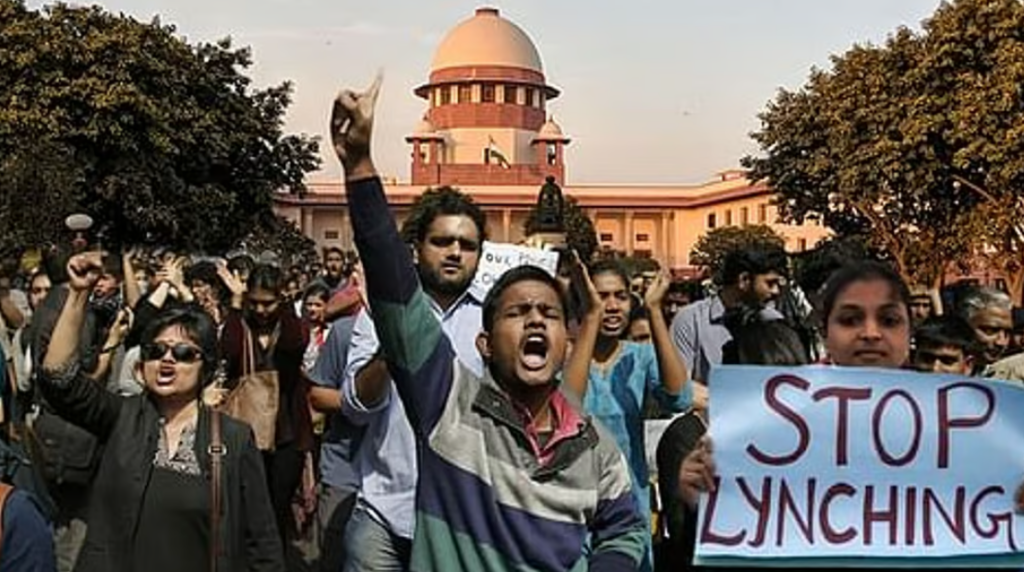Shreya Gupta
On 11th February 2025, the Supreme Court of India decided to close a public interest litigation (PIL) petition that had raised concerns regarding mob violence and mob lynching incidents, particularly those carried out by “cow vigilantes” under the pretext of preventing cow smuggling and slaughter. A Bench comprising Justices BR Gavai and K Vinod Chandran reasoned that it would be impractical for the Supreme Court, sitting in Delhi, to micromanage such issues, as the factors contributing to these incidents vary across different States. Justice Gavai also referred to a previous case regarding the demolition of properties, where the Court had allowed parties to approach the competent authorities, emphasizing that situations differ from state to state, including those related to beef consumption.
The Court noted that in the landmark Tehseen Poonawalla v. Union of India (2018) 9 SCC 501, it had already issued detailed directions mandating action against mob lynching incidents. These directions remain binding on all authorities, and any violation of the same provides aggrieved persons with legal remedies. The Bench further held that it was not feasible for the Supreme Court to oversee these matters across the country and that any person affected should approach the competent court in accordance with the law. In line with this reasoning, the Court also declined to examine the constitutional validity of cow protection laws enacted by various states, asserting that such challenges should be brought before the respective High Courts.
The PIL was filed by the National Federation of Indian Women. Their counsel, Advocate Nizamuddin Pasha, contended that despite the Supreme Court’s earlier directions, incidents of mob lynching continue to take place, particularly due to the enforcement of cow protection laws in certain states. He argued that these laws have effectively empowered private individuals with police-like authority to seize vehicles and apprehend individuals suspected of cattle smuggling. Pasha further claimed that the attitude of state authorities needed scrutiny, as they often displayed open bias, making judicial oversight necessary. He pointed out that such laws were in force in thirteen states and had led to increased violence by cow vigilantes.
The Court, however, reiterated that such state-specific laws should be challenged before the relevant High Court. It emphasized that criminal acts remain the responsibility of the state to prevent and prosecute, questioning whether it would be appropriate for the Supreme Court to oversee individual cases of mob lynching. In response, Pasha highlighted that state authorities themselves often refused to register FIRs against the perpetrators, arguing that a pattern of state inaction was emerging across multiple states. Justice Gavai questioned whether the Court should base its decisions on perceived patterns and asked if Pasha was representing any direct victim of such violence.
Solicitor General of India, Tushar Mehta, intervened to inform the Court that the Central government had introduced a law under the Bharatiya Nyaya Sanhita to specifically penalize mob lynching. He asserted that the legal framework governing such incidents had now evolved, rendering the PIL unnecessary.
The Supreme Court ultimately closed the case, stating that it could not establish a uniform criterion for compensating victims of mob lynching incidents. It reasoned that compensation must be determined on a case-by-case basis, as the severity of injuries varies across different victims. The Court held that issuing uniform directions for compensation would be unjust, as it would undermine the discretion available to authorities and courts in assessing individual cases. It concluded that the plea for a blanket compensation policy was not in the best interest of the victims.
Case Title: National Federation of Indian Women v. Union of India & Ors.
Case Number: Writ Petition (Civil) No. 719 of 2023
Bench: Justice BR Gavai and K Vinod Chandran
Instagram: Click here.
LinkedIn: Click here.
For Collaboration and Business: info.desikaanoon@gmail.com

